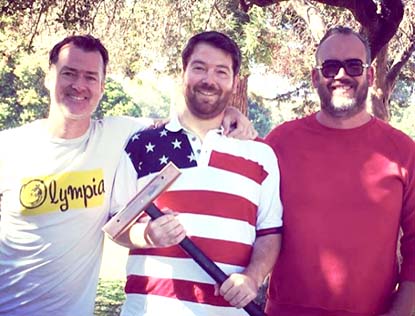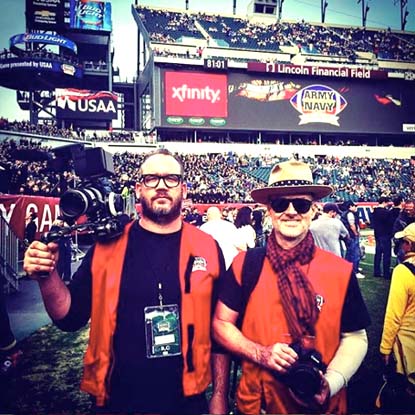

|
Back to |
| The Front Page |
| News & Features |

|
The day the movie people came to England to consult a croquet expert |
|
by James Hawkins
|
James Hawkins has proven his expertise in many ways and in several media, and was the obvious choice for the movie guys to go to England to interview as the final word on the serious sport of croquet. At the least, it would balance the huge party that occupies the central focus of the film, the annual croquet bash between Navy and St Johns. Each side has a different explanation as to how the St Johns nerds usually beat the very sport Navy guys in those games. The movie is being made by two Navy men who have sought for the answer, nevertheless, all over the US and finally, in Mother England.
People regard you differently once you've acquired the status of 'Expert'. I have been around long enough to know a little bit about croquet generally, and a lot about some of the sport's more specific esoterica. So it was flattering to receive the email from Brian O'Hare.
He told me about his documentary on the Annapolis Cup, the annual croquet battle between the croquet-savvy hipsters of St Johns College and their ultra-competitive (but hopelessly futile) neighbours at the Naval Academy in Maryland. You're an expert, James, can we come to the UK to interview you about the history of croquet? I was intrigued, so we started discussing how this might work.
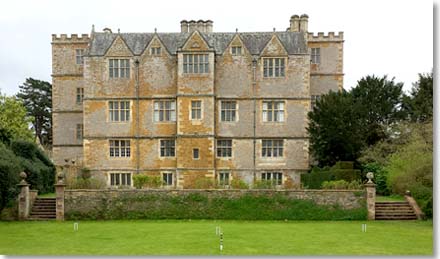
|
| Chastleton House was completed in 1612, and was the home of Walter Jones Whitmore. Whitmore wrote the first set of standardised rules in the 19th Century, so this location may justifiably claim to be the birthplace of the sport of croquet. |
For the outsider, the enticing UK filming location for a croquet documentary would be Wimbledon. I advised against it. For one thing, it's a long--and arguably irrelevant--story to explain how the All England Lawn Tennis Club was established for the benefit of croquet, and how croquet was supplanted by tennis. For another thing, it's a bloody nightmare for me to get to South West London by train. For the latter reason I suggested an alternative.
Croquet's origins come not from London, but from 80 miles north west of the capital. Here is the former home of Walter Jones Whitmore, who conceived the original rules of the game. He lived in the run-down mansion of Chastleton House and it was here that the first recognisable version of croquet was played. A big old house with 400 years of history is a dream location for a film crew, and this is where Brian and Zach chose to focus their attention.
Nobody lives at Chastleton these days, and it's managed by the National Trust, a charitable organisation which preserves much of England's heritage. It's open to the public but not--as we discovered--in November. So filming was set for early March. Chastleton is a 30-minute drive from the Croquet Association's headquarters at Cheltenham, so they decided to do some brief filming of the house, then a rendezvous at the English Croquet Association's headquarters for my interview.
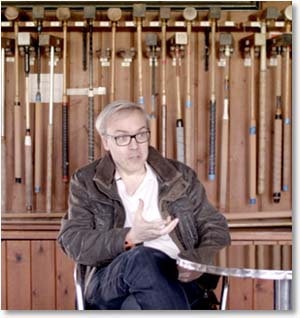
|
| James Hawkins settles in for an interview at Cheltenham, despite the cold. |
It was a cold and drizzly afternoon, and Cheltenham Croquet Club wasn't fully out of its winter hibernation. A couple of diehards were outside getting some pre-season practice. Brian and Zach arrived on schedule, having hired a London-based cameraman and a production assistant. Brian has a vaguely academic air, dressed for an English winter, and with a new-found obsession with old croquet textbooks. Zach is a huge bear of a man with a massive friendly handshake. Here they were, having flown halfway round the world just to speak to me.
Filming at Chastleton had been a great success. Now they were ready for the last sequence for the movie. I'm their only overseas interviewee and it's my job to put their local story into an international context.
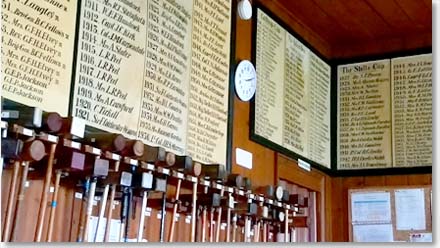
|
| This honours boards is one of many in the clubhouse at the eleven-court Cheltenham Croquet Club, HQ of the English Croquet Association. . The oldest board, dating from the early years of the 20th century, provided the backdrop for the French interview. |
| THE CROQUET EXPERT'S VITAE |
|
James Hawkins has spent a lifetime developing a wide-ranging expertise in croquet. He took up the game seriously as a teenager in the mid-1980s, and has played at championship level in both Golf and Association Croquet throughout the UK. He was editor of the Croquet Gazette from 2001 to 2005, and has devoted much of the last twenty years to coaching. His book 'Complete Croquet: A Guide to Skills, Tactics and Strategy' dissects and reconstructs the modern game, and is regarded as one of the definitive texts on how to play. He has published articles on the social history of croquet, and how the sport is perceived in popular culture and in advertising media--some of which are published in Croquet World. He is, in short, the consummate expert on the sport of croquet.
|
Zach and I talk about how this is going to work. We're just two guys sitting in the bar of a croquet club having a chat. I'll look slightly away from the camera towards him. He'll prompt me with questions and I'll reframe my answers so that they can edit out all the bits where he speaks. This is the filmmaker's trick to contrive an appearance of naturalness without the need for the subject to be genuinely natural.
We're all ready to start and the camera guy throws me a curveball. Is that your jacket on the chair over there? There's too much glare off your white sweatshirt, so I'd like you to take it off. Plan B is the plain white t-shirt I had underneath (a bit scruffy, could do with ironing), and my waterproof waxed jacket. If my teeth chatter, they'll edit that out.
We start. There's 540 minutes on the camera's memory, so I have nine hours in which to come up with two minutes of interesting stuff. My name is James Hawkins, and I'm an expert in… Am I an expert? I kinda know a lot about croquet tactics, and I know a bit about the history of croquet… To be honest, Zach, there's a load of stuff I'd need to look up in a book.
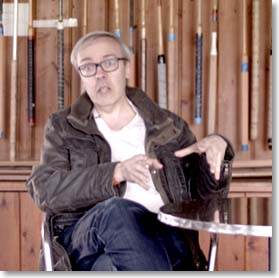
|
| Gesturing to explain a point, Hawkins plays his role as expert. |
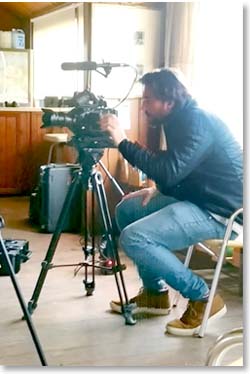
|
| This cameraman was engaged in London to help with the camera and the settings at Chastleton House and Cheltenham. |
I make this sound as though it's all contrived. It really isn't. Until the filming I hadn't given much thought to the genesis of bad tactics. From a military and conventionally sporty starting point, the obvious croquet strategy would be to keep close to your partner and to score slowly and methodically without losing ground to your opponent. Modern croquet tactics rely on higher risks and higher rewards. And I turn the topic round to talk about my own experience of top flight play.
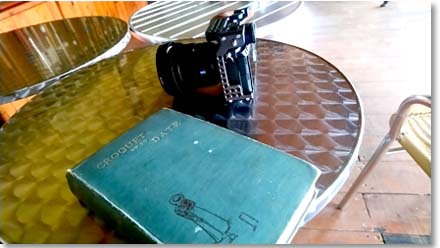
|
| Arthur Lillie's book 'Croquet Up To Date' (1900) has become the Holy Grail for the filmmakers. Lillie devotes a whole chapter to the negative defensive tactics of the Aunt Emma player. |
I was always the unsporty kid who was last to be picked for the school soccer team. Left shivering on the sidelines, I was the least likely person to continue in competitive sport in adult life. Being weedy, bookish and short-sighted doesn't make me or the students at St John's uncompetitive; and being athletic and confident doesn't mean that the guys at the Naval Academy will all be brilliant croquet players. So there it is--the opinion of an expert. St John's win the Annapolis Cup so often because they deserve to.
And that--as the movie guys might say--is a wrap. The interview process is strangely liberating, and apparently I'm a natural subject. I know that I'm not the central focus of Zach and Brian's movie, so I could have said absolutely anything I liked. Over the course of an hour I meandered through my own thoughts, periodically getting lost and starting again. But I know that the snippet that makes the final cut of the film will be the fifth attempt where I appear witty, intelligent and informed. It all strengthens my reputation as an expert.
|
ZACH SPEAKS FOR THE MOVIE GUYS
We always knew shooting in England in March might not only prove to be cold, but also wet. We got both, in spades. Though it's something we had expected, I have to confess I didn't really think it would be as much of an issue as it turned out to be. When you think of croquet, or if you've been to the lovely NCC in West Palm Beach, Florida, what you imagine is what you get: a sunny day, pastels, crisp white uniforms, champagne, cheese, picnicking, all set against a country-club-like backdrop. The Chastleton House--which James wanted us to see as the birthplace of modern croquet--is what many Americans would consider a mansion, but in England is one of a few thousand "stately manors" dotting the English countryside. Though it's being "kept up" by its conservators, it's also been allowed to decay since it was built in the 1800's, which makes for not only a great patina, but also some odd creaks, cracks, and smells. At one time I'm sure it was a beautiful home, and in many ways it still very much was, but not the place you would expect to be the birthplace of modern day croquet. (Or maybe we just came at the wrong time of year.)
We also found out that there isn't a lot of croquet played at the Chastleton House. Though that's disappointing, it seems as if the conservationists liked it that way--so the house is manageable with the small number of visitors they have per year, and any more would require more money and more work and staff to keep it up. It's a shame, though. because it's such a beautiful place, in a beautiful setting. Had it been a lovely spring day, I can imagine that there are scant few places where a croquet enthusiast would rather play the sport. Cold, wet, hungry and eager to get the lowdown on the state of English croquet, past and present, after filming at Chastelton House, we headed off in our very small cars (at least for people my size: 6'4" and 250), to visit England's NCC and our "expert" James Hawkins. When we arrived, we were very excited and were met by James and a few other members of the club, who all seemed pleased that we were doing this and taking an interest in the sport. Most members of the croquet community are more than happy--at least initially--to speak with us and share their love of the game, and James was no different. The only problem was, it was getting later and colder, and there was no heat in the small, yet historic, croquet clubhouse we were in. Though I had my Navy p-coat on, it was damp and I was still very cold. James, god bless him, looked like he was dressed to go get the morning paper off his front lawn--in some kind of brown jacket, and a white hoodie--certainly not his "club" attire or the croquet attire we would have imagined. Nevertheless, it was oddly quite refreshing, if only slightly disappointing for a filmmaker. So it was off with the hoodie, keep the jacket on, and the white t-shirt. It's going to get cold, so I took off my jacket so I would be as cold if not colder than him during the filming. I thought to myself, this is going to be a quick one--it was that cold inside. James, like many of his English brethren, is self-deprecating in the best way. His "unsureness"--if you can call it that--is endearing and engaging. It started off with him avoiding calling himself an expert--a title I gave him that he didn't seem comfortable with. But after a bit of discussion, I think he realized he actually WAS the expert we needed--either that or he just gave in.
I knew I was smiling a lot, but only to help put him at ease, and give him some level of reassurance that what he was doing was right. And what he was doing WAS right. Out of all of the people we've interviewed, James seemed most prepared. He knew how to navigate my sometimes complicated answers, recognize what I was looking for, and rephrase it in a way that sounded like he was doing voice over work for the BBC 1, or was on a television show on A&E about English sports. He was nothing short of amazing, and I milked every last drop out of him. It wasn't until I saw the muscles in his neck quivering that I knew he must be freezing and was doing his best to hold it in. I asked Brian to pipe up with another question, And Brian essentially asked him to discuss the Aunt Emma level of play and the Naval Academy--a tough but necessary question--which James navigated well, and very quickly after that reminded me that he was quite close to hypothermia…. Another amazing interview was in the books and off we went, back to London to celebrate our victory with a warm shower, and some solid rest. It had been, however, a great day. Through wet and cold, the reception we got everywhere we went was warm and inviting. There isn't a whole lot of difference between the two countries and the members within the croquet community. However there is a massive difference between the St Johns College/Navy match and the oh-so-serious organized sport of croquet. I think that's a good thing. - Zachary Guerra |
The documentary will be about 80 minutes long when it's completed. Zach and Brian have been all over the US filming more than 60 interviews, from San Francisco where they spoke to Ben Rothman, to Los Angeles, San Diego, Santa Fe, Austin, Annapolis, Baltimore, Washington, D.C., Virginia, and West Palm Beach, and finally, Mother England, where they found an expert in James Hawkins. Readers who want to catch the film in theaters in should tune into www.cannonshotdoc.com. Zach and Brian are looking for On-Demand release of the documentary (VOD, Netflix, Amazon, Apple, etc.) by the end of 2019.
